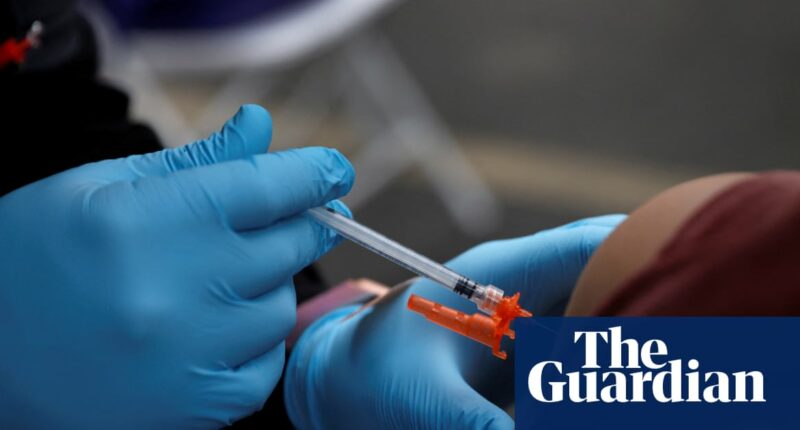Share this @internewscast.com
There is a lot of confusion about Covid vaccines this year.
In late August, the Food and Drug Administration (FDA) announced it had revoked emergency use authorizations, a mechanism for speeding up the availability of certain drugs, for Covid-19 vaccines. Furthermore, it stated that new, updated versions of the Covid-19 vaccine had been approved, but only for specific groups.
The new restrictions now confine the vaccines to adults who are 65 and older, as well as those who have at least one underlying health condition that increases their risk of severe Covid – a substantial change from previous guidelines that permitted vaccines for all Americans aged six months and up. This decision coincides with the spread of a new Covid strain called XFG or “Stratus” in the US.
US health secretary and known vaccine skeptic, Robert F Kennedy Jr, applauded the FDA in a post on X, remarking that the revised framework concluded the Biden-era vaccine “mandates” while maintaining that vaccines are “available to those who want them.”
FDA commissioner Dr. Marty Makary echoed this sentiment, stating in his own post: “100% of the adults in this country can still get the vaccine if they choose.”
But access probably won’t be that straightforward, say experts.
Dr. Adam Ratner, a member of the American Academy of Pediatrics (AAP) committee on infectious disease, remarked, “We have plenty of Covid circulating in the US.” He emphasized the importance of vaccination, stating, “The more people who choose not to vaccinate their kids and not to vaccinate themselves, the more it will spread.” He expressed concern that reduced vaccination rates could result in “larger and more severe outbreaks.”
Below, what we currently know about the availability of Covid-19 vaccines in the US in 2025.
What Covid vaccines will be available this year?
Kennedy announced that the FDA had granted approval for Moderna vaccines for those six months and older, Pfizer vaccines for those five years old and older, and Novavax vaccines for individuals 12 years old and older.
Who can get a Covid vaccine this year?
Although administration health officials claim that any adult who wants a vaccine will be able to get one, experts say that is unlikely to be the case in practice.
“This is misleading,” wrote Dr Jake Scott, a clinical associate professor of infectious diseases at Stanford Medicine, in a reply to Makary’s tweet. He went on to outline barriers the new restrictions have imposed: “Insurance won’t cover off-label use ($150+ costs), pharmacies can’t administer [vaccines] without CDC recommendations you haven’t issued, and you eliminated Pfizer for under-5s entirely.”
“‘Available’ with barriers isn’t accessible,” he concluded.
Scott told the Guardian that the FDA’s announcement “causes so much chaos and confusion”.
Under the FDA’s newly announced rules, people under 65 must be considered “high risk” to qualify.
It is unclear whether official CDC immunization guidelines will be the same. The CDC’s advisory committee on immunization practices (ACIP), which develops recommendations for the use of vaccines, will meet in September and discuss Covid vaccine policy.
But there is concern among the medical community about the ACIP’s upcoming recommendations. In June, Kennedy fired all 17 sitting members of the panel, and announced eight new members, many of whom are vocal vaccine skeptics.
“There’s a lot of concern about this ACIP and our ability to get science-based recommendations from them,” says Ratner.
Who counts as ‘high risk’ for Covid vaccine eligibility?
Under the FDA’s new rules, adults under 65 qualify for a Covid vaccine if they have “at least one underlying condition that puts them at high risk for severe outcomes from Covid-19”.
But what qualifies as an underlying condition is unclear. “The definitive answer to that has not been put out by the FDA or the CDC yet,” says Dr Richard Ricciardi, a practicing nurse practitioner and associate dean for clinical practice and community engagement at the George Washington University School of Nursing. “So who qualifies for a vaccine is still a little nebulous.”
A previous list put out by the CDC in February 2025 lists 22 qualifying conditions, including asthma, cancer, diabetes types 1 and 2, HIV, mental health conditions including depression, obesity, physical inactivity and smoking.
There is also reason to believe that the CDC’s new list will not be the same. Although the previous list includes pregnancy as an underlying condition, Kennedy announced in May that Covid vaccines were no longer recommended for healthy pregnant women and children.
This reversal was made without the usual outside input by professional medical organizations, and in June, the AAP and dozens of other major medical associations signed an open letter opposing this new policy.
“Pregnancy’s a risk factor for a lot of reasons,” says Ricciardi. “Your lungs are compressed, your immune system changes dramatically and you don’t fight off infections as well as you would when you’re not pregnant.”
Ricciardi adds that pregnant women have safely been getting Covid vaccines for years. “And now they’re not able to,” he says.
after newsletter promotion
Can children get the Covid vaccine?
Since the CDC no longer recommends Covid-19 vaccines for healthy children, there is confusion among parents and healthcare providers about whether children will be able to get Covid vaccines or other routine vaccines, says Ratner.
The new guidelines are at odds with the AAP’s recommended vaccine schedule, Ratner says. The AAP’s position is that “infants and children 6 months through 23 months of age are at high risk for severe Covid-19” and that all of those within this group who do not have any contraindications should be vaccinated against the disease.
“For older kids, a risk-based approach is reasonable,” says Ratner. The group suggests that any child with high risk factors should be vaccinated, and any parents who want their children – high risk or not – to get vaccinated should be able to do so.
Going forward, parents will have to consult with pediatricians to determine whether their child gets a vaccine. If they have a healthy child, the pediatrician may have to administer the vaccine off-label (meaning an unapproved use of a drug) and there is no guarantee doctors will be comfortable doing this.
“I wish I had a good answer to how people are going to access vaccines in the coming weeks and months,” says Ratner. “I guess we will find out more, but it’s a frustrating and confusing time for all of us.”
What if you want a Covid vaccine but don’t qualify for one under the new guidelines?
In theory, it is possible for adults who do not qualify as high-risk to get off-label prescriptions. But Scott says he suspects there’s going to be a lot of hesitation among doctors to “prescribe something off-label that they may be liable for”.
“Can you go to Canada and get it? Yeah, you probably could,” says Ricciardi. “But why would we have to go to another country to get vaccinated?”
Where can you get a Covid vaccine this year?
During the 2024-2025 cold and flu season, nearly 90% of people who received a Covid shot received it in a pharmacy, according to CDC data.
But pharmacists aren’t sure what the 2025-2026 season will look like.
“Pharmacists are a little bit anxious because if the ACIP takes on and recommends the same guidelines the FDA has approved, a lot of patients will be unable to get a Covid-19 vaccine,” says Allison Hill, the director of professional affairs at the American Pharmacists Association.
Pharmacy regulations also vary from state to state. Some states have their own statutes, while others follow ACIP recommendations. And some states allow pharmacists to administer vaccines that are off-label, while others do not.
This confusing tangle of rules has already led two of the country’s biggest pharmacy chains, CVS and Walgreens, to severely limit how and where they are providing vaccines. A spokesperson for CVS said on Friday that the chain would continue to offer vaccines in 34 states, require prescriptions to administer them in 13 states and the District of Columbia, and stop offering Covid vaccines altogether in Massachusetts, Nevada and New Mexico.
The spokesperson said this was a result of “the current regulatory environment”, and that the lists “may change at any time”.
Patients may be able to get vaccines at their doctor’s office, but that’s not guaranteed.
Even if someone is at high risk, getting a prescription for a vaccine may not be easy. “In the US, a lot of people don’t have insurance,” says Scott. “And a lot of people who have insurance don’t have primary care doctors, and they don’t get much medical attention.”
Requiring people to jump through hoops will only further deter people from getting vaccines, says Hill.
“We know that patients, when they come into the pharmacy and you talk to them about a vaccine, they really need to get that vaccine then and there,” she says. “If you have to wait on a prescription, you lose the patient.”












